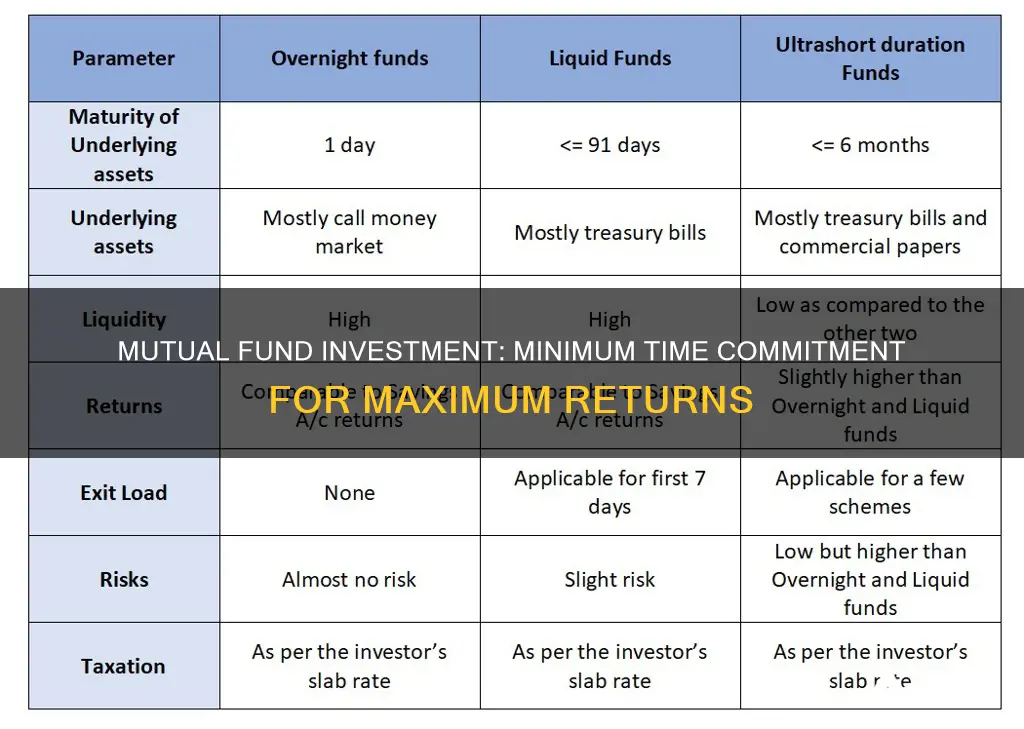
Mutual funds are a popular investment vehicle, with over half of American households investing in them. They are a type of investment that pools money from multiple investors to purchase a diversified portfolio of stocks, bonds, or other securities. There are various types of mutual funds, including stock, bond, money market, and target-date funds, each with its own investment strategy and risk profile. When investing in mutual funds, it is important to consider the fees associated with them, such as expense ratios, sales charges, and redemption fees, as these can significantly impact overall investment returns. While mutual funds offer a relatively liquid investment option, with the ability to redeem shares on any business day, early withdrawals may incur fees and tax implications. It is also important to note that mutual funds are subject to market risk, interest rate risk, and management risk, and there is no guarantee of returns.
| Characteristics | Values |
|---|---|
| Minimum investment period | 1 day |
| Maximum investment period | Perpetual |
| Purchase of mutual fund shares | End of the trading day |
| Settlement of transactions | Within 2 business days of the trade date |
What You'll Learn

Mutual funds are a long-term investment
The minimum period to invest in mutual funds can be as short as a day, but mutual funds are generally considered a long-term investment.
Mutual funds are a popular investment vehicle, particularly for retirement savings. They are a type of investment fund that pools money from multiple investors to purchase a diversified portfolio of stocks, bonds, or other securities. This diversification of investments and assets within a portfolio is one of the main advantages of investing in mutual funds. It helps to reduce risk, and a mutual fund can achieve diversification faster and more cheaply than buying individual securities.
Another benefit of mutual funds is that they are professionally managed. A mutual fund manager oversees the portfolio, deciding how to divide money across sectors, industries, and companies based on the fund's strategy. This provides investors with access to a full-time manager to make and monitor investments at a relatively low cost.
While mutual funds can be bought and sold on the open market, they are not traded freely like stocks and ETFs. They are typically bought and sold directly from the financial company that manages the fund or through an online discount brokerage or full-service broker.
Many funds require a minimum contribution, often between $1,000 and $10,000, and some are higher. It's important to research the different funds available, as there are thousands to choose from, catering to different types of investors and investment goals.
Mutual funds charge various fees, including annual fees, expense ratios, or commissions, which can lower overall returns. These fees should be considered when investing in mutual funds, as they will impact the total returns generated from the investment.
When investing in mutual funds, it's important to take a long-term view. Constant trading of mutual fund shares can have serious implications for the fund's remaining shareholders, as it can trigger capital gains taxes and increase administrative and operational costs, leading to higher expense ratios. Therefore, fund companies discourage frequent trading to protect the interests of long-term investors.
Mutual funds may also charge early redemption fees or bar shareholders from trading for a certain number of days if they sell their shares within a short period, typically 30 to 180 days, after purchasing them. This is to discourage short-term trading and promote long-term investment in mutual funds.
In summary, while the minimum period to invest in mutual funds can be as short as a day, mutual funds are generally considered a long-term investment. The benefits of mutual funds, such as diversification and professional management, are most effective when investors take a long-term view and avoid frequent trading.
Schwab 1000 Index Fund: A Smart Investment Strategy
You may want to see also

The minimum investment period is one day
The minimum investment period for mutual funds is one day. This means that investors can get units allotted at a particular net asset value (NAV) and redeem them at the next day's NAV. While a one-day investment period is possible, it is important to note that mutual funds are typically designed as long-term investments. Selling early or trading frequently can trigger fees and penalties.
Mutual funds are pooled investments managed by professional money managers. They provide individual investors with access to a diversified portfolio of stocks, bonds, or other securities. By pooling their money with other investors, individuals can benefit from economies of scale and potentially lower investment risk.
When investing in mutual funds, it is essential to understand the fees associated with them, as these costs will significantly affect overall returns. Some common fees include expense ratios, sales charges or loads, redemption fees, and account fees. These fees can vary depending on the type of fund and the brokerage firm.
It is worth noting that mutual funds are not traded freely on the open market like stocks and exchange-traded funds (ETFs). They can be purchased directly from the financial company that manages the fund or through an online discount brokerage or full-service broker. Many funds also require a minimum contribution, which can range from $1,000 to $10,000 or more.
While a one-day minimum investment period is an option, it is generally recommended to adopt a long-term investment approach with mutual funds. This allows investors to take advantage of compound interest and avoid the fees associated with early redemption. Additionally, it is important to consider the potential tax implications of buying and selling mutual fund shares.
Investment Funds vs Savings Accounts: Where Lies the Risk?
You may want to see also

Redemption fees apply to early withdrawals
There is no minimum period for investing in mutual funds, as the minimum tenure for investment is a day. However, investors should be aware that redemption fees may apply if they sell their shares within a specified time frame. These fees are typically charged to discourage short-term trading and can vary depending on the time period, with common redemption periods being 30, 90, 180 days, and one year.
Redemption fees, also known as exit fees, market-timing fees, or short-term trading fees, are imposed by mutual funds and other funds when investors sell their shares. The fee is usually calculated as a percentage of the transaction amount, typically ranging from 1% to 2% of the total investment. The Securities and Exchange Commission (SEC) in the US generally limits redemption fees to 2% of the sales amount.
The purpose of redemption fees is to cover administrative costs and commissions incurred when selling stocks or investments. By charging these fees, funds can also encourage long-term investments and reduce market-timing behaviour and frequent trading. The fees collected are added back to the mutual fund, benefiting the remaining shareholders by providing more capital for the fund to reinvest and grow.
To avoid redemption fees, investors can consider no-load mutual funds, which do not charge fees for buying and selling. Alternatively, investors can choose to invest in exchange-traded funds (ETFs), which offer a simple way to gain exposure to the stock market for a low fee. ETFs charge an expense ratio, typically ranging from 0.03% to 1%, which is an annual fee based on the percentage of the investor's total investment.
A Beginner's Guide to Index Funds: Investing Your First $100
You may want to see also

Mutual funds are managed by professionals
There is no minimum period for investing in mutual funds. The minimum tenure for investment in Mutual Funds is a single day, and the maximum is "perpetual".
Mutual funds are pooled investments that are managed by professional money managers. They trade on exchanges and provide an accessible way for investors to access a wide mix of assets selected for the fund.
A mutual fund is an investment vehicle that pools money from multiple investors to purchase a diversified portfolio of stocks, bonds, or other securities. This allows individual investors to gain exposure to a professionally managed portfolio and potentially benefit from economies of scale, while also spreading risk across multiple investments.
The mutual fund manager oversees the portfolio, deciding how to divide money across sectors, industries, and companies based on the fund's strategy. The manager is legally obligated to follow the fund's stated mandate and to work in the best interest of the shareholders.
There are many types of mutual funds, including stock, money market, bond, and target-date funds. Each has its own investment focus and strategy, allowing investors to choose funds that align with their goals and risk tolerance.
While mutual funds offer many benefits, it's important to consider the fees associated with them, as these will affect overall returns. These include annual fees, expense ratios, and commissions. Additionally, mutual funds are not as flexible as stocks or ETFs when it comes to buying and selling, as they can only be traded once daily after the markets close.
Blackstone's Borrowed Funds: A Strategic Investment Move
You may want to see also

There are different types of mutual funds
There is no minimum period for investing in mutual funds. The minimum tenure for investment is one day, and the maximum is 'perpetual'.
- Stock Funds: These funds invest primarily in stocks or equity. They can be categorized by the size of the companies they invest in (small-, mid-, or large-cap) or their investment approach (aggressive growth, income-oriented, or value).
- Money Market Funds: These funds invest in safe, short-term debt instruments like government treasury bills. They offer slightly higher returns than regular savings accounts but with low risk.
- Bond Funds: These funds focus on investments that pay a set rate of return, such as government bonds, corporate bonds, and other debt instruments. They aim to provide regular income from interest payments.
- Target-Date Funds: These funds are designed for retirement savings and automatically adjust their holdings as the investor's retirement date approaches. They typically start with a higher percentage of growth funds and gradually shift to income-oriented funds over time.
- Growth-and-Income Funds: These funds invest in stocks that pay dividends and have prospects for earnings growth. They also invest in bonds to provide a more stable source of income.
- Income Funds: These funds primarily invest in government and high-quality corporate debt, holding these bonds until maturity to provide a steady income stream.
- Capital-Preservation Funds: These funds invest in low-risk, short-term securities like US Treasury bills and CDs. They aim to preserve the initial investment, even though they are not federally insured or guaranteed.
- Portfolio Series Funds: These funds offer a mix of different mutual funds to help investors pursue a wide range of goals, such as preservation, balance, and growth, within a single diversified fund.
It's important to note that mutual funds carry varying levels of risk, and investors should carefully consider their investment objectives, risk tolerance, and time horizon before choosing a specific type of fund.
Smart Ways to Invest $25,000 in Mutual Funds
You may want to see also







